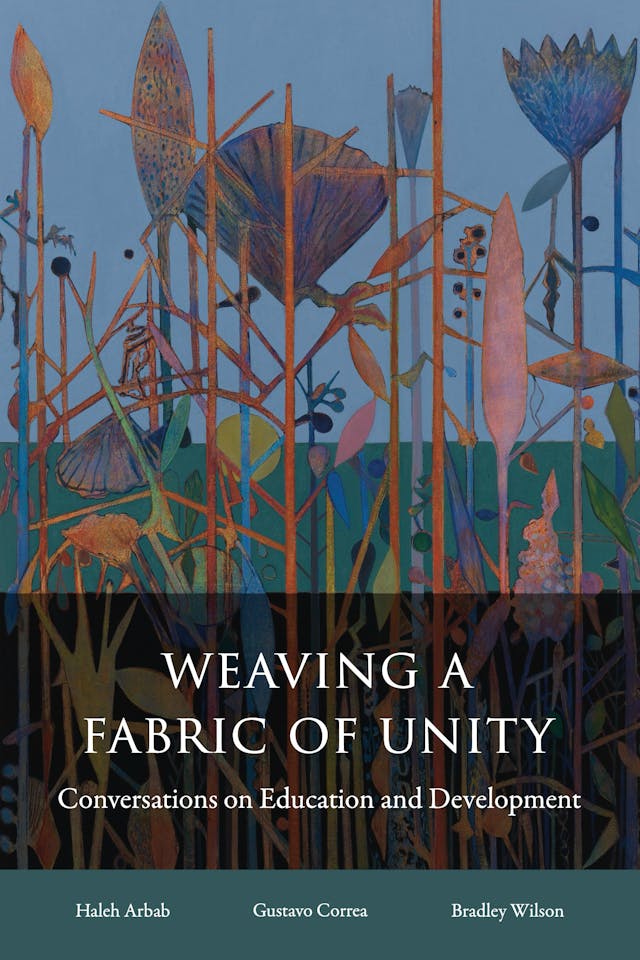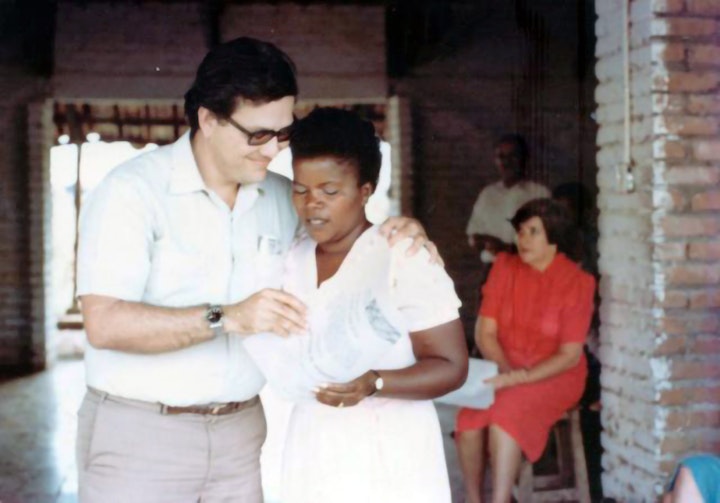Publications

Weaving a Fabric of Unity
The following is an extract from Weaving a Fabric of Unity: Conversations on Education and Development. The book shares the story of the pioneering enterprise that came to be identified as FUNDAEC (the Foundation for the Application and Teaching of Science), highlighting five decades of stories, learning and insight from key individuals central to shaping its evolution.
Learn more about the book“We can’t stop. This seed must continue to grow”

Good morning to all. My name is Rosa María Orejuela, and I am from the youngest municipality in Colombia, Guachené. I am also from the first graduating class of FUNDAEC. I will tell you some things that have been very important in my life. But before that, I want to thank Almighty God, Mother Nature, life itself, my family, my parents, and you, my teachers, who helped me build my life. I arrived at FUNDAEC in 1974—but don’t do the math (laughing). When I arrived at FUNDAEC, I had a three-year-old baby.
I remember that in Guachené, the markets are on Mondays, and I went to buy potato chips. There, Maritza Mancilla told me, “Do you want to study? A man has arrived looking for young people to study.” And I told her, “Liar, why do you tell such lies? People don’t come and look for you to study with them.” But Maritza said, “Come, I will introduce him to you.” Maritza introduced me to Gustavo Correa.
Gustavo was sitting on a bench around a wooden table. I was coming from the square to buy some socks for my baby, and I said to him, “Sir, good morning.” He replied politely, “Good morning, sit down.” He took out a sheet of paper from his math text with a numerical problem to solve. When I solved it, he asked me, “Would you like to be included in an educational program?” Gustavo, don’t you remember? When he told me I could be included, my heart jumped with joy, and I went looking for my mother. I told her, “Mom, I’m going to study. But don’t worry, you don’t have to invest money there. We do not have to pay, and they will provide food.”
I had an ugly suitcase. I packed as much as I could into that thing with all my joy. I put the suitcase on my head like this (making an upward motion with her arms), like putting a jar on your head when you go out to collect water. And they said, “Rosita, where are you going?” I left that day. I didn’t know what I was doing, but I left walking through Guachené, San Jacinto, La Dominga, El Crucero de Gualí, and I arrived at La Arrobleda. When I arrived, I met a lady who had also traveled there to cook for us, Doña Leo. And I said, “Madam, hello, I am included in the study program: where am I going to sleep?” And she told me, “Ah, yes, yes yes,” and placed me in a cabin with everything I needed. They gave me a glass of milk, but I was not used to drinking milk, so it made me feel a bit sick, but that’s another story.
When we started, I went to the field with Arnubio, another colleague who had experience with rice cultivation. He said to me, “What do you know about rice?” I told him, “No, nothing, but I am ready to learn; let’s get started.” I began studying and put my heart and soul into all the materials FUNDAEC gave us: community service, descriptions, mathematics, and health. I loved it a lot. But it was also a struggle, as I was a single mother.
I have this intense feeling sometimes: I don’t know what would have happened to me if I had not trained at FUNDAEC (now crying, sobbing). What would have become of my life? I carry this in all my heart because there was nothing more for me, especially as a single mother. It was FUNDAEC. I say this because there are still new young people who have to know that they have to struggle and put their desire into learning. They must have the will to know and struggle because the betterment of our community is out there; it is possible. We’re just getting started.
In the morning hours, I wrote down some words inspired by FUNDAEC and my teachers that I want to read to you all: “Life has no manual. We build the manual ourselves to understand what we do step by step. We build the family we want. We build the region we want. The human being is not a container to fill. She is a being with capabilities that allow her to develop herself and the environment in which she lives.” That is what FUNDAEC did. This is what we learned. FUNDAEC transformed us to say to the members of our community: “Hello, how do you feel? If there are problems, how can I help you? If you have an interest in serving others, then let’s develop together and move forward.”
With the years I have left, I feel very strengthened and very blessed by God. I got breast cancer about two years ago, but here I am in control and fighting it. Believe me. On September 25, 2020, I was preparing a meal when I opened my cell phone, and it said, “Death Farzam Arbab.” I held onto the phone, crying and asking God why. I was crying loudly in the house, and some women there came and asked me, “What happened, Rosita?” and I said, “My teacher died.” This caused me such sadness that I didn’t know what to do.
Gustavo, Haleh, and others: We can’t stop. This seed must continue to grow. I have 12 grandchildren. I came into the world to serve them, too. So I don’t know what we are going to do. I started to think about my children’s and my grandchildren’s education; what would it be like? Gustavo, this cannot end. This development, this moral development, this spiritual development, technological development, professional development, this growth of science, and so on. FUNDAEC must continue to grow to foster transformation in Norte del Cauca and elsewhere for future generations.

Weaving a Fabric of Unity
The following is an extract from Weaving a Fabric of Unity: Conversations on Education and Development. The book shares the story of the pioneering enterprise that came to be identified as FUNDAEC (the Foundation for the Application and Teaching of Science), highlighting five decades of stories, learning and insight from key individuals central to shaping its evolution.
Learn more about the book